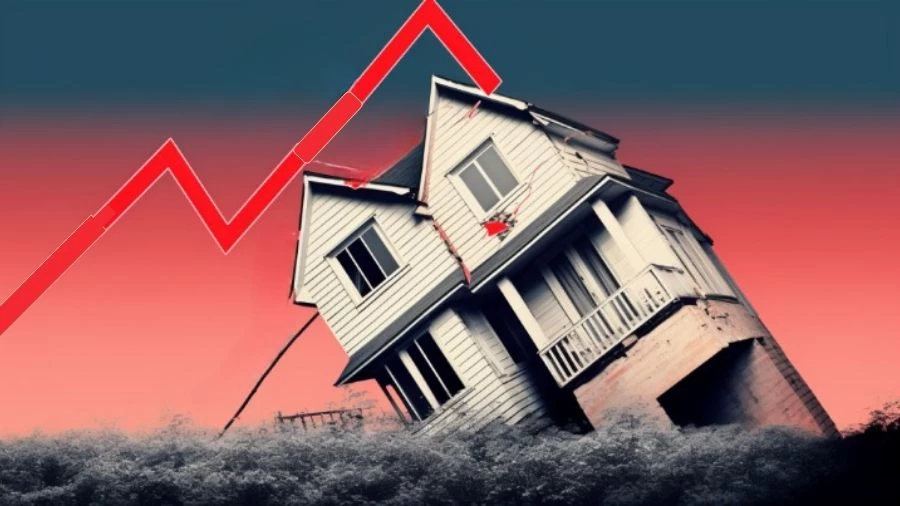
Is the Housing Market Going to Collapse? Will the Housing Market Crash in 2024?
The U.S. housing market is expected to remain stable in 2024, and the timeline for a neglected house to collapse depends on various factors.
by Sai V
Updated Sep 07, 2023
On This Page
- Is the Housing Market Going to Collapse?
- Will the Housing Market Crash in 2024?
- How Long Does It Take for a House to Collapse?
- What Are the Five Reasons Provided for the Housing Market's Stability?
- What Can Cause a Housing Market Crash or the Bursting of a Housing Bubble?
- What Happens to the Housing Market During a Recession?
- What Are the Warning Signs of a Housing Bubble Burst?
- What Factors Suggest a Housing Market Crash is Improbable?
- What Does the Housing Market's Future Hold After a Recession?
Is the Housing Market Going to Collapse?
The current state of the U.S. housing market bears some resemblance to the period leading up to the 2008 housing crash, with rising mortgage rates and concerns of a potential recession. However, key indicators, such as homeowners' stronger financial positions and builders' cautious approach to construction, suggest that while there may be price declines in certain markets, a full-scale collapse akin to the Great Recession is highly unlikely.
The market's stability is further bolstered by a shortage of homes for sale, preventing a repeat of a severe downturn. Furthermore, the housing market's resilience can be attributed to the lessons learned from past crises, which have led to more prudent lending practices and regulatory safeguards in place.
While economic conditions may fluctuate, the overall consensus among experts is that the housing market is better positioned to weather challenges and is unlikely to experience a catastrophic collapse on the scale of the past, offering some reassurance to both buyers and homeowners.
Will the Housing Market Crash in 2024?
No, the housing market is not expected to crash in 2024. While concerns have arisen due to historically high home prices and elevated mortgage rates, experts anticipate some relief as mortgage rates are predicted to cool slightly. The Federal Reserve's campaign against inflation, which influenced the rise in rates, is expected to ease, potentially encouraging more buyers and sellers to participate in the market.
However, the persistently low housing inventory and high demand suggest that the market will likely remain competitive. Despite the challenges, a housing crash in 2024 appears unlikely, with the market poised to maintain stability, though affordability may continue to be a concern for many.
How Long Does It Take for a House to Collapse?
The deterioration timeline of a house left to neglect hinges on several factors, including its construction quality, local climate, current condition, and materials used. In general, water proves to be a relentless adversary, initiating a chain reaction of decay. Typically entering through the roof, water corrodes roofing materials, leading to leaks that compromise interior components like drywall and paint.
Water can also penetrate the home's envelope, deteriorating walls, windows, and door frames. In the long run, neglect can result in structural instability, making the house susceptible to collapse. However, the exact timeframe for a house to fall apart varies based on location and initial quality, ranging from decades to possibly centuries in less severe cases.
The demise of a neglected house is often an unsightly and hazardous process. As the structure deteriorates cosmetically with leaking roofs, peeling paint, and interior damage, it also experiences structural decay. Insects like termites and carpenter ants exploit the moisture, further compromising the house's integrity. Vandalism can accelerate the deterioration, and the weight of a deteriorated roof may eventually cause collapse.
Vegetation growing nearby can weaken the house's foundation over time, potentially leading to a sinkhole forming beneath the house. The timeline for a house to fully deteriorate depends on multiple factors, including climate, initial construction quality, and maintenance, but it can take decades or even centuries for a neglected house to reach its final, crumbling state.
What Are the Five Reasons Provided for the Housing Market's Stability?
Low Inventory Levels:
One key factor contributing to the stability of the housing market is the persistently low inventory of available homes for sale. According to data from the National Association of Realtors, as of July, there was only a 3.3-month supply of homes on the market. This is a significant improvement from early 2022 when the supply was even scarcer at just 1.7 months. The ongoing shortage of available homes has led to competitive bidding and price increases. This imbalance in supply and demand makes a sudden price crash unlikely in the near future.
Limited Pace of Residential Construction:
The housing market's stability is also influenced by the pace of homebuilding. Following the housing crash of 2008, homebuilders scaled back their operations and never fully returned to pre-2007 levels. Consequently, they are struggling to keep up with the surging demand for housing. While they are building as much as possible, it is improbable that we will witness the overbuilding that characterized the market 15 years ago. As a result, the fundamental reason for rising prices remains heightened demand and a limited supply, which suggests that any market correction will not occur abruptly.
Favorable Demographic Trends:
Demographic shifts are bolstering the stability of the housing market. Several factors are contributing to the strong demand for homes. Firstly, many existing homeowners have reevaluated their housing needs during the pandemic and sought larger living spaces, particularly with the rise of remote work. Secondly, the millennial generation, a significant and financially active demographic, is currently in their prime home-buying years. Lastly, the growing Hispanic population is increasingly interested in homeownership. These demographic trends collectively create a robust demand for housing.
Stringent Lending Standards:
Unlike the lax lending standards that prevailed in the mid-2000s, the housing market today is characterized by stringent lending standards. Borrowers are required to meet strict criteria, including excellent credit scores and thorough income verification. The median credit score for mortgage borrowers in the second quarter of 2023, as reported by the Federal Reserve Bank of New York, was a robust 769. This cautious lending environment reduces the risk associated with subprime mortgages and helps prevent the artificial inflation of prices through loose lending standards, which could lead to a housing crash.
Limited Foreclosure Activity:
Another factor supporting the housing market's stability is the absence of widespread foreclosure activity. Unlike the period following the 2008 housing crisis when millions of foreclosures flooded the market and drove down prices, the current foreclosure activity is relatively muted. Most homeowners have built up substantial equity in their homes, and lenders refrained from initiating foreclosure proceedings during the height of the pandemic, resulting in record-low foreclosure rates in 2020. While there has been a slight uptick in foreclosures since then, it remains far from the levels seen during the previous housing crisis.
What Can Cause a Housing Market Crash or the Bursting of a Housing Bubble?
A housing market crash or a housing bubble burst can result from factors such as high unemployment, dwindling buyer demand, declining homeowner equity, and a surge in foreclosures, all of which can signal instability within the market. These elements, whether occurring together or in isolation, serve as early indicators of potential housing market troubles, demanding close attention and assessment from stakeholders to gauge and mitigate risks.
Unemployment and Economic Downturns:
- Unemployment Spike: A significant increase in unemployment rates can signal danger for the housing market. When people lose jobs and income, they may struggle to make mortgage payments, leading to distressed home sales and potential foreclosures.
- Recession and Layoffs: Economic recessions and large-scale layoffs can have a detrimental impact on the housing market. Predictions of an upcoming recession can lead to a rise in households falling behind on home loans.
Buyer Demand and Market Sentiment:
- Persistent Demand: Strong buyer demand is essential for a healthy housing market. If buyer demand suddenly disappears, it could be a sign of trouble. Factors like rising interest rates, economic uncertainty, or affordability issues can affect demand.
- Market Sentiment: Consumer confidence and sentiment play a role in the housing market's stability. Negative sentiment, driven by factors like economic instability or uncertainty, can lead to reduced demand.
Homeowner Equity and Mortgage Practices:
- Homeowner Equity Decline: A massive drop in homeowner equity can indicate potential problems. This decline may result from falling home values or an influx of buyers making minimal down payments, leaving homeowners financially vulnerable.
- Mortgage Practices: The types of mortgages being offered and the creditworthiness of borrowers can impact market stability. Risky mortgage practices, such as subprime lending, contributed to the 2008 housing crash.
Foreclosure Rates and Warning Signs:
- Foreclosure Filings: A sudden and substantial increase in foreclosure filings is a significant warning sign. Monitoring quarterly foreclosure caseloads is crucial, as a spike of more than 10% per quarter can indicate danger for the housing market.
- Historical Comparison: Looking at historical patterns, such as the foreclosure crisis of the late 2000s, can provide insights into potential market risks. Early warning signs in the form of foreclosure spikes were observed before the Great Recession.
Regional Variations and Local Factors:
- Regional Differences: The housing market can vary significantly from one region to another. Local economic conditions, housing supply and demand, and regulatory factors can influence regional housing market trends.
- Local Policies: Government policies, zoning regulations, and local incentives can impact the housing market. Understanding the specific dynamics of a local market is crucial for assessing risk.
What Happens to the Housing Market During a Recession?
During a recession, the housing market undergoes several notable shifts. Economic uncertainty and increased unemployment often lead to a slowdown in housing activity, with prospective homebuyers becoming more cautious about their investments. This caution can result in delayed purchasing decisions and a potential increase in foreclosure activity as individuals struggle to meet their mortgage payments.
However, when economic conditions worsen, central banks may lower interest rates to stimulate the economy, making it more affordable for buyers to secure mortgages and potentially reinvigorating the housing market. The impact on the housing market can vary depending on the severity of the recession, with milder recessions having a lesser effect on home prices compared to more severe economic downturns.
What Are the Warning Signs of a Housing Bubble Burst?
The warning signs of a housing bubble burst typically include a rapid and unsustainable increase in home prices over a short period, often driven by speculative buying and excessive demand. When home prices significantly outpace wage growth and economic fundamentals, it can indicate the presence of a housing bubble. Additionally, high levels of mortgage debt, easy access to credit, and a surge in new construction that exceeds demand are red flags.
Monitoring these factors, along with market sentiment and regulatory actions, can help identify the potential risks associated with a housing bubble and prepare for possible market corrections.To gauge the likelihood of a housing bubble burst, it's crucial to track key indicators like home price trends, lending practices, and overall market stability. While current conditions may not point to an imminent housing crash, staying vigilant and informed about these warning signs is essential for homeowners and investors alike.
What Factors Suggest a Housing Market Crash is Improbable?
Several key factors suggest that a housing market crash is improbable despite concerns raised by some experts. First, the housing market has seen a slight cooling with decreasing prices, but they remain higher than the previous year, indicating a degree of stability rather than a crash. Moreover, for homeowners who purchased their properties in recent years, the value of their homes remains higher than their initial investment, providing a sense of security.
Second, unlike the circumstances leading up to the 2008 housing crash, today's homeowners have built up significant equity due to increased down payments, which acts as a robust financial cushion against economic downturns or job losses. These factors collectively paint a picture of a housing market that is more resilient and less susceptible to a severe crash akin to the 2008 recession.
What Does the Housing Market's Future Hold After a Recession?
Following a recession, the housing market's future appears to be poised for a reset. Economists anticipate a slowdown in the economy, leading to lower mortgage rates, which could attract more prospective homebuyers. However, the market's performance will be contingent on the extent of rate reductions and the severity of the recession.
Despite these potential opportunities, the housing market continues to grapple with a persistent supply challenge due to various factors, including longer homeowner tenures, slowed new construction, and demographic trends. This long-term supply issue is expected to shape the housing market's dynamics for years to come, even as home builders remain cautiously optimistic about increased demand for new homes.
Is the Housing Market Going to Collapse - FAQs
1. Will the housing market crash in 2024?
Unlikely, given factors like low inventory and stringent lending standards.
2. What causes a housing bubble burst?
High prices, excessive demand, and risky lending practices.
3. How long for a neglected house to collapse?
Varies, from decades to centuries, depending on factors.
4. What happens to the housing market during a recession?
Slows down, cautious buyers, potential rise in foreclosures.
5. Why is a housing crash improbable?
Stable prices, increased equity, and prudent lending practices.




